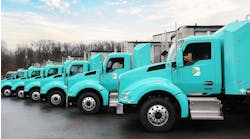Q: What is the difference between CK-4 and FA-4?
A: The primary difference in the two new API performance categories for heavy duty oil is with backward compatibility. API CK-4 oils will be recommended for virtually all high-speed four stroke cycle diesel engines – including older engines that were using API CJ-4, as well as new engines that are currently being developed. The use of API FA-4 oils will be more limited and OEMs will not recommend them for use in most older diesel engines. This API FA-4 category is focus on the next generation of on-highway diesel engines that were designed to take advantage of the fuel economy advantage of the thinner oil.
Other differences include:
- API CK-4
- Viscosity grades include both SAExW-40 and xW -30 engine oils with >3.5 cP high-temperature high-shear (HTHS) viscosity
- Higher level of wear and oxidation protection compared API CJ-4 oils
- Improved shear stability
- API FA-4
- The same wear and oxidation protection required for API CK-4
- Improved fuel economy
- Applies only to SAE 10W-30 and SAE 5W-30 viscosity grades that have HTHS viscosity in the range of 2.9 to 3.2 cP
- Developed to protect engine parts even with thinner oil films
Information provided by: Chevron



